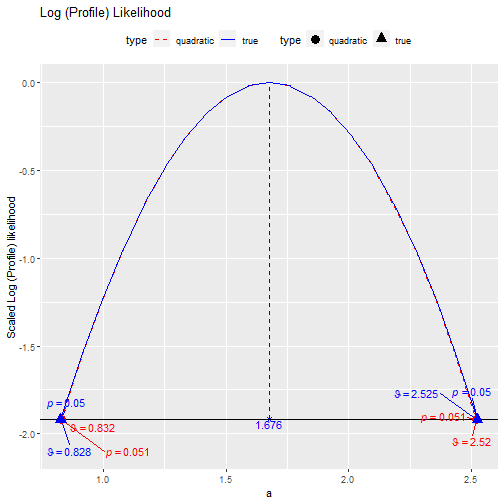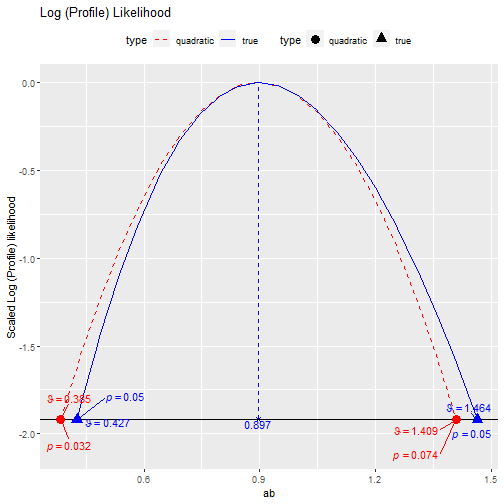
Log Profile Likelihood of a Parameter
Shu Fai Cheung
2023-05-04
Source:vignettes/loglike.Rmd
loglike.RmdIntroduction
This vignette illustrates how to use loglike_compare()
in the package semlbci to
compare the log profile likelihood of a parameter in a structural
equation model (SEM) when it is fixed to a range of values to the log
profile likelihood approximated by a quadratic function, using the
method by Pawitan (2013).
Limitations
The function loglike_compare() and its helper functions
are for creating illustrative examples and learning only, not for
research use. Therefore, they are not as versatile as
semlbci() in the types of models and parameters supported.
They can only be used for free parameters and user-defined parameters
not involved in any constraints. Only a model fitted by maximum
likelihood is supported. Last, they will not check whether the
computation is appropriate for a model. It is the responsibility of the
users to ensure that the computation is appropriate for the model and
parameter.
Despite these limitations, they are still useful for generating graphs for illustration and learning.
Fitting a Simple Mediation model
Suppose a simple mediation model is fitted to the dataset
simple_med, came with the package semlbci:
library(lavaan)
library(semlbci)
dat <- simple_med
mod <-
"
m ~ a * x
y ~ b * m
ab := a * b
"
fit <- lavaan::sem(model = mod,
data = simple_med,
fixed.x = FALSE)
parameterEstimates(fit)
#> lhs op rhs label est se z pvalue ci.lower ci.upper
#> 1 m ~ x a 1.676 0.431 3.891 0.000 0.832 2.520
#> 2 y ~ m b 0.535 0.073 7.300 0.000 0.391 0.679
#> 3 m ~~ m 34.710 3.471 10.000 0.000 27.907 41.513
#> 4 y ~~ y 40.119 4.012 10.000 0.000 32.256 47.982
#> 5 x ~~ x 0.935 0.094 10.000 0.000 0.752 1.118
#> 6 ab := a*b ab 0.897 0.261 3.434 0.001 0.385 1.409Log Profile likelihood Plots
The a-path
To generate the plot for the a-path coefficient, we can
simply call loglike_compare() and setting the parameter to
"a".
ll_a <- loglike_compare(fit,
par_i = "m ~ x")Although teh a-path is labelled, par_i requires
the parameter specified in lavaan::model.syntax. Please
refer to the help page of loglike_compare.
By default, 21 values will be used to generate the plot. This can be
controlled by the argument n_points.
Once the run finishes, we can use plot() to plot the
likelihood values:
plot(ll_a, add_pvalues = TRUE)
As expected, the log profile likelihood of the a-path is well-approximated by the quadratic approximation.
The indirect effect
Let us examine the log profile likelihood of the indirect effect. To
specify it, we need to use ab :=:
ll_ab <- loglike_compare(fit,
par_i = "ab := ")Note that it usually take longer for parameter which is a nonlinear function of other parameters, such as an indirect effect, which is the product of two other parameters.
This is the plot:
plot(ll_ab, add_pvalues = TRUE)
We can see that, as expected, the quadratic approximation is less satisfactory for the indirect effect.
Please refer to the help page of loglike_compare() and
its plot method (plot.loglike_compare()), for other
available options.
Final Remarks
The other functions, loglike_range(),
loglike_point(), loglike_quad_range(), and
loglike_quad_point() are helper functions used by
loglike_compare(). They are exported such that interested
users can use them to compute the points directly.
More examples can be found in the “examples” folders in the OSF page for this package and Cheung and Pesigan (2023). Some of the figures in the examples were generated by these functions.
Reference
Cheung, S. F., & Pesigan, I. J. A. (2023). semlbci: An R package for forming likelihood-based confidence intervals for parameter estimates, correlations, indirect effects, and other derived parameters. Structural Equation Modeling: A Multidisciplinary Journal. 30(6), 985–999. https://doi.org/10.1080/10705511.2023.2183860
Pawitan, Y. (2013). In all likelihood: Statistical modelling and inference using likelihood. Oxford University Press.